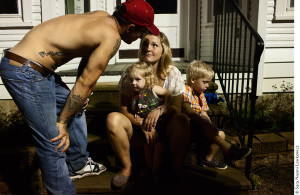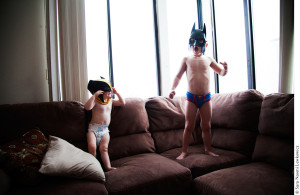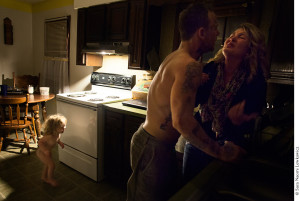Sara Naomi Lewkowicz - Shane and Maggie: A Portrait of Domestic Violence

World.Report Award 2013 – Spot Light Award
Award motivations
The author was able to tell in details the vicissitude and the traumas of domestic violence by choosing to show the story of Maggie.
Maggie’s domestic story becomes paradigm to visually show the dynamics of family relationships that are progressively degenerate into violence and pain.
A linear narrative style and choosing to talk about this issue by telling the story on one person involves while the violence occurs, give the reportage a strong emotional load and a direct and immediate way to understand the story.
Shane and Maggie: A Portrait of Domestic Violence
Domestic violence is a largely invisible crime.
We usually only hear it muffled through walls, and we usually only see it manifested in the faded yellow and purple bruises of a woman who “walked into a wall” or “fell down the stairs”.
It is rarely limited to one event, and it rarely stops.
My project, “Shane and Maggie”, seeks to portray domestic abuse as a process, as opposed to a single incident, examining how a pattern of abuse develops and eventually crests, as well as its short- and long-term after effects on victims, their families, and their abusers.
While our only encounters with abuse typically only see victims of abuse in the hours or days after having been abuse. This project is a departure because I was witness to Maggie and Shane’s entire relationship, from within a month of the beginning of their courtship, to the end that left her with bruises and him in handcuffs.
I have continued to follow Maggie, as her story did not conclude with Shane’s arrest. Maggie moved to Alaska in an attempt to reconcile with her estranged husband, Zane, who is father to her two children, and a soldier in the army. My second goal is to examine the long-term effects of the abuse on her current relationship, on her children, and on her own sense of self. By observing the parallels between the Post-Traumatic Stress Disorder Maggie suffers from, and her husband’s experience of the same disorder, it’s possible to explore the parallels between the wars we fight overseas, and the wars we fight in our homes.
Sara Naomi Lewkovicz
 Sara Lewkowicz is a native New Yorker pursuing a master’s degree in visual communication from Ohio University in Athens. She received her bachelor’s degree in journalism from the University of North Carolina at Chapel Hill. She is currently studying abroad in London.
Sara Lewkowicz is a native New Yorker pursuing a master’s degree in visual communication from Ohio University in Athens. She received her bachelor’s degree in journalism from the University of North Carolina at Chapel Hill. She is currently studying abroad in London.
Her work has been published in Time Magazine, Stern, L’Espresso, Das Magazin, Internatzionale, the Baltimore Sun, and numerous other magazines and newspapers. She has won several grants and awards, including the 2013 Alexia Student Grant and the 2013 Ville de Perpignan Remi Ochlik Award, and she has been named the 2013 College Photographer of the Year by POYi. She has a particular interest in documenting gender and sexuality issues.
Internet website: www.saranaomiphoto.com









